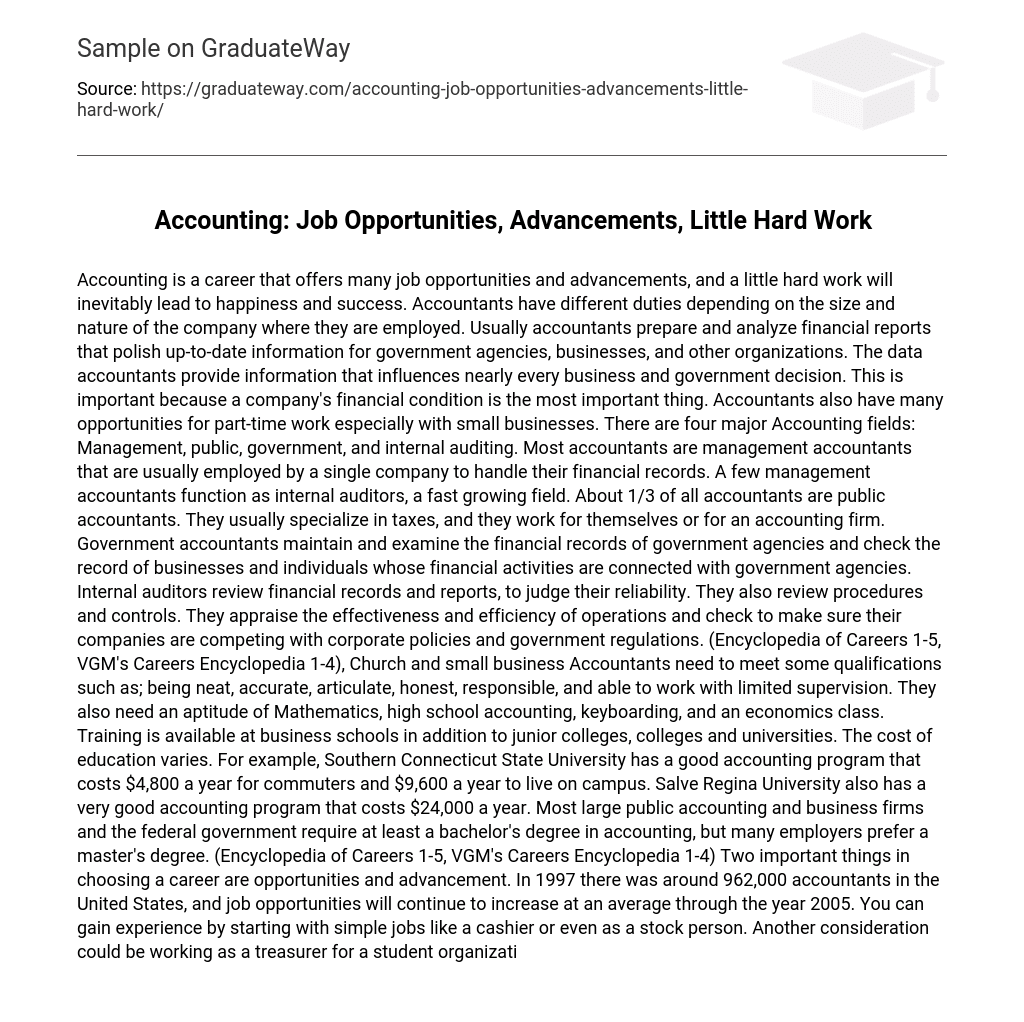Accounting offers various career opportunities and growth potential, enabling individuals to attain satisfaction and prosperity through diligent effort. Accountants’ specific duties may vary depending on the organization’s size and type.
Accountants play a vital role in the preparation and analysis of financial reports for various entities, including government agencies, businesses, and organizations. The information they provide holds great significance as it heavily influences decision-making processes in both business and government sectors. Consequently, their work is of utmost importance due to the criticality of accurately assessing a company’s financial position. Additionally, accountants have part-time opportunities available to them, particularly with small businesses. There are four primary fields within accounting: management accounting, public accounting, government accounting, and internal auditing. The majority of accountants operate in management accounting where they manage the financial records of a single company.
The demand for internal auditors who work as management accountants is increasing. Around 33% of accountants specialize in tax-related matters and work as public accountants, either self-employed or employed by an accounting firm. Government accountants, on the other hand, are in charge of managing the financial records of government agencies and analyzing the financial activities of businesses and individuals associated with these agencies. Internal auditors have a vital role in ensuring the accuracy of financial records and reports, as well as evaluating procedures and controls.
The effectiveness and efficiency of operations are evaluated by accountants, who also ensure that their companies adhere to corporate policies and government regulations. These requirements are applicable to both church and small business accountants. Qualifications for these positions include being neat, accurate, articulate, honest, responsible, and capable of working with limited supervision. Additionally, accountants must possess skills in Mathematics, high school accounting, keyboarding, and economics. Education and training can be obtained at business schools, junior colleges, colleges, and universities, with varying costs associated.
The accounting program at Southern Connecticut State University costs $4,800 annually for commuters and $9,600 annually for students residing on campus. On the other hand, Salve Regina University offers an accounting program at a cost of $24,000 per year (Source: Encyclopedia of Careers 1-5, VGM’s Careers Encyclopedia 1-4).
Most large public accounting firms, business companies, and the federal government typically require a bachelor’s degree in accounting. However, many employers prefer candidates with a master’s degree.
Career selection is influenced by opportunities for advancement and growth. In the United States as of 1997, there were approximately 962,000 accountants. Job prospects are expected to continue increasing until 2005. To gain experience in the field of accounting, individuals can start with simpler job roles such as working as a cashier or even as a stock person.
Having the role of treasurer in a student organization offers valuable experience in financial planning and money management. In the accounting profession, there are various opportunities for career growth, such as becoming a chief plant accountant, chief cost accountant, budget director, or manager of internal auditing. Skilled accountants can also aim for corporate positions like controller, treasurer, corporate president, financial vice president, or president. Earning income is vital for individuals seeking employment as it allows them to provide support for their families and themselves.
Junior accountants and auditors typically begin their careers earning around $25,000 per year, but this amount increases to an average of $35,000 over time. Accountants with a bachelor’s degree start at an average annual salary of $29,400. The growth in salary is similar for both public and private accountants, and the compensation level is influenced by the size of the company or firm. In public accounting, mid-level positions offer salaries ranging from $28,200 to $32,000 for lower positions and from $30,000 to $75,000 for upper positions. Salaries tend to be lower in smaller towns but higher in larger cities with higher living costs.
Salaries for different positions in the company vary. Managers can earn between $40,000 to $80,000 per year, while controllers typically make around $85,000 annually. The highest earners are CFO’s who have the potential to make over $142,900. These salaries offer a comfortable living for most people. Furthermore, as individuals gain more experience and move up in position, their benefits also improve.
Accountants in larger firms and corporations typically enjoy greater benefits compared to accountants in smaller firms (Encyclopedia of Careers Vocational guidance p.6). Overall, accounting is a profession offering numerous job prospects, opportunities for career growth, and the potential for a fulfilling income that can lead to happiness, success, and the formation of a wonderful family (Encyclopedia of Careers and VGM’s Careers Encyclopedia).





